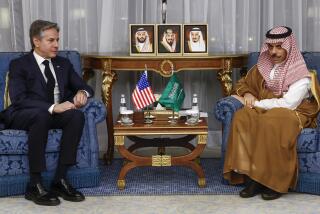Shultz Upbeat on Arms at Start of 10-Day Trip
- Share via
WASHINGTON — Secretary of State George P. Shultz left for a 10-day trip to the Middle East and Moscow on Thursday expressing confidence that he can “wrap up” the first U.S.-Soviet arms control agreement in eight years but conceding that he has no new formula to revive the Arab-Israeli peace process.
At a press conference a few hours before his plane took off, Shultz said he was disappointed that U.S. and Soviet negotiators in Geneva have been unable to complete work on a treaty banning intermediate-range nuclear missiles. But he said that he and Soviet Foreign Minister Eduard A. Shevardnadze should be able to finish the job in two days of meetings.
“I should think that we would be able to wrap it up,” Shultz said. “There is no issue of principle that should prevent that.”
May Delay Summit
However, he added, if the Soviets balk on the intermediate nuclear force issue, the proposed summit meeting between President Reagan and Soviet leader Mikhail S. Gorbachev should be postponed until an agreement is reached. Shultz and Shevardnadze are expected to set a date for a summit meeting, probably in late November in the United States.
“If it turns out that their attitude changes, (and) they don’t want an agreement--I’m not saying that there is anything that suggests that--(then) I think we should wait (for a summit) until we have one.”
Shultz was far less sanguine concerning his first trip to the Middle East in 29 months. With elections scheduled in both Israel and the United States next year, this visit probably marks the last chance for the Reagan Administration to suggest a way to break the impasse in the Arab-Israeli peace process.
Shultz supports plans for an international conference to provide the forum for negotiations between Israel and Jordan. But Israeli Prime Minister Yitzhak Shamir is adamantly opposed to such a meeting, and U.S. officials concede that it is unlikely that Shultz will be able to change his mind.
Shultz said that his focus would be much wider than the longstanding Arab-Israeli hostility, clearly indicating that he is not prepared to push either side toward a settlement.
“I think it’s time to go and review the bidding with our friends on the peace process, on the Persian Gulf (war), on Soviet Jewry, on general internal developments such as in Egypt where President (Hosni) Mubarak has just won this very fine political victory.”
Shultz’s schedule is heavily weighted toward Israel. He will spend three nights there while limiting his time in Saudi Arabia to 3 1/2 hours and in Egypt to 5 1/2 hours.
In a region where diplomacy often involves elaborate exchanges of hospitality, the Shultz schedule stops just short of an insulting snub. Arab leaders are grumbling privately that Shultz apparently has no hope of doing significant business.
Shultz said he plans to meet with some West Bank Palestinians during his stay in Israel. He said the United States supports “the legitimate rights” of Palestinians, but he made it clear that he will not pressure Israel into easing its military occupation of the West Bank of the Jordan River and the Gaza Strip.
Hussein showed his displeasure by declining to return to Jordan from London to play host to Shultz in his Amman palace. Shultz and the monarch will confer in London. Hussein also plans to meet in the British capital with Yuli M. Vorontsov, a Soviet first deputy foreign minister, apparently as a show of independence from the United States.
More to Read
Sign up for Essential California
The most important California stories and recommendations in your inbox every morning.
You may occasionally receive promotional content from the Los Angeles Times.










